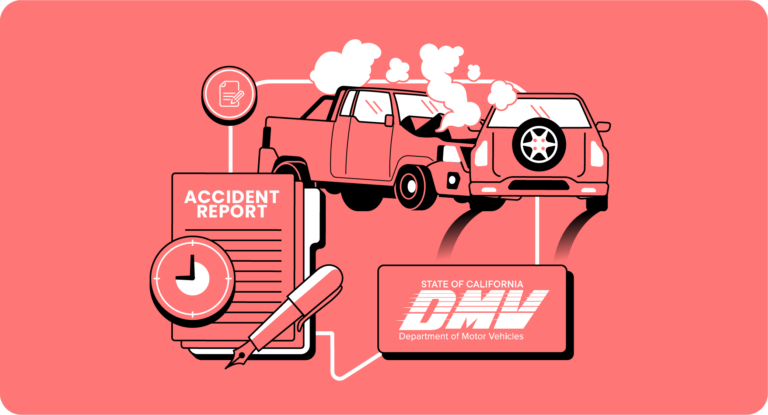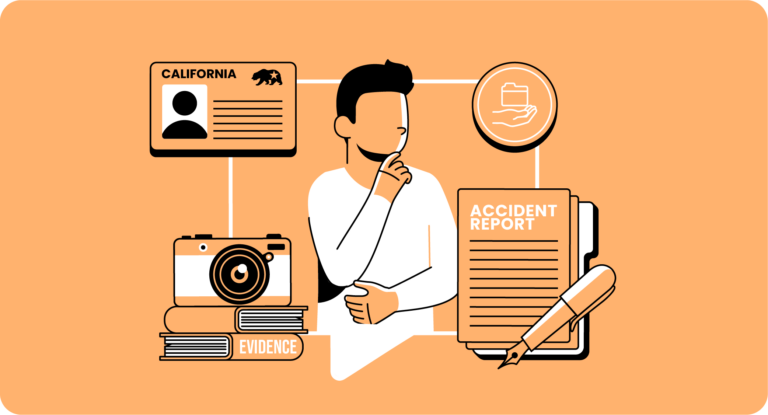If you were involved in a significant collision, California law requires you to report the accident to the DMV within a specific timeframe. Filing the proper forms ensures compliance with California Vehicle Code § 16000 and protects your ability to pursue compensation. Understanding the reporting requirements can help you avoid penalties and delays in your car accident case.
Understanding the California DMV Reporting Requirement
California Vehicle Code § 16000 requires drivers involved in significant collisions to report the accident to the DMV by completing an SR-1 form. This requirement applies to both at-fault and non-fault drivers involved in qualifying accidents. Reporting the collision ensures the DMV maintains accurate records and holds drivers accountable for their actions on the road.
A DMV accident report must be filed if the collision involves injuries, fatalities, or property damage exceeding $1,000. Failing to comply with this requirement can result in penalties, including license suspension. Filing the report promptly helps protect your legal rights and creates an official record of the incident for insurance and liability purposes.
When Do You Need to File a DMV Accident Report?
Certain scenarios require drivers to file a DMV accident report under California Vehicle Code § 16000. Filing the S-1 form is mandatory for collisions involving injuries, fatalities, or significant property damage. Below, we outline these situations in greater detail:
Accidents Resulting in Injuries to Drivers, Passengers, or Pedestrians
If anyone involved in the collision suffers an injury, no matter how minor, you are required to file a report with the DMV. This includes injuries to drivers, passengers, or pedestrians that result from the crash. Filing an SR-1 form ensures that the accident is properly documented and that injured parties can seek compensation for medical bills and related expenses.
Even if the injury seems minor at the scene, it is still important to report the accident. Some injuries, like whiplash or internal trauma, may not become apparent until days after the crash. By filing the report, you protect your ability to resolve claims and comply with California law.
Collisions Causing Property Damage Over $1,000
Any accident resulting in property damage exceeding $1,000 requires a DMV accident report. This threshold applies to damage to vehicles, roadside structures, or other property affected by the collision. The SR-1 form documents the extent of the damage and provides a record for insurance purposes.
If you are unsure whether the damage exceeds $1,000, it is best to err on the side of caution and file the report. The cost of vehicle repairs or replacement often adds up quickly, especially when multiple vehicles are involved. Filing the report ensures you meet legal requirements and avoid penalties.
Accidents Involving Fatalities
When a collision results in a fatality, drivers involved are required to report the accident to the DMV. This requirement applies whether the fatality occurs at the scene or later as a result of the injuries sustained in the crash. Filing an SR-1 form is critical for documenting the incident and providing information for legal and insurance purposes.
In fatal accidents, law enforcement may also create a detailed accident report, but drivers are still responsible for submitting the SR-1 form to the DMV. Failing to file the report can lead to serious consequences, including license suspension or additional legal liabilities.
Pro Tip
Do not assume that just because law enforcement is creating their own report this will be sufficient for you to pursue compensation. Following the law, retaining legal counsel, and filing all necessary reports with the DMV and your insurance provider create the foundation for your claim.
Timeframe for Reporting an Accident to the DMV
Drivers must file an SR-1 form with the DMV within 10 days of the accident. This deadline applies to all collisions that meet the criteria under California Vehicle Code § 16000, including those involving injuries, fatalities, or property damage exceeding $1,000. Filing promptly ensures compliance with state law and prevents delays in processing insurance claims.
How to File a DMV Accident Report in California
Filing a DMV accident report in California involves completing the SR-1 form and submitting it to the DMV within 10 days of the collision. This form is required for accidents involving injuries, fatalities, or property damage exceeding $1,000, as outlined in California Vehicle Code § 16000. Ensuring the form is completed accurately and submitted on time is critical to avoiding penalties and processing insurance claims efficiently.
Tip
Do not wait to file your SR-1 form even though you have 10 days to do so. Filing this form as soon as you are able can help ensure this step is not missed or forgotten which could affect your ability to pursue compensation.
Information Required for Filing the Report
To file the SR-1 form, you must provide specific details about the accident and the parties involved. Accurate and complete information ensures that the DMV processes your report without delays. Below are the required details you will need:
- Driver names, license numbers, and addresses – Include information for all drivers involved in the collision.
- Insurance company name and policy number – Provide your insurance details and request the same from other drivers.
- Date, time, and location of the collision – Specify the exact date, time, and address or intersection where the accident occurred.
- Vehicle information – Include the make, model, year, and license plate numbers of all vehicles involved.
- Description of injuries or property damage – Clearly outline any injuries sustained and damage to vehicles or other property.
- Witness names and contact information – If there were witnesses to the accident, include their details to support your case.
Having this information ready before completing the form helps ensure accuracy and avoids delays in processing your report.
Common Mistakes When Filing DMV Accident Reports
Filing an SR-1 form can be straightforward, but errors can cause unnecessary delays or even penalties. Below are common mistakes to watch out for and tips on how to avoid them:
Submitting an Incomplete Form
One of the most frequent mistakes is leaving sections of the SR-1 form blank. Missing information, such as insurance details or driver’s license numbers, can result in your report being rejected or delayed. Take the time to review the form carefully and ensure that all required fields are filled out accurately.
Double-checking the form before submission is the best way to avoid this issue. If you are unsure about a specific section, contact the DMV or your insurance company for clarification. Providing all necessary details upfront prevents unnecessary complications or delays.
Incorrect Accident Details
Providing inaccurate information about the date, time, or location of the collision can create confusion during the claims process. These errors may lead to disputes with insurance companies or issues with liability determinations.
To prevent mistakes, verify the accident details against police reports or your own records. Accurate information ensures your report aligns with other evidence and supports your case effectively.
Missing Witness Information
Forgetting to include details about witnesses is another common error that can weaken your report. Witnesses provide additional perspectives on how the collision occurred, which can be invaluable for liability determinations.
Always gather the names and contact information of any witnesses at the scene. Including this information in your report strengthens your case and ensures that witness statements can be obtained if necessary.
Note
When at the scene, politely ask if you can record any witness statements so the incident is fresh in the minds of any individuals who saw the accident occur firsthand.
Delayed Submission of the Report
Failing to submit your SR-1 form within the 10-day timeframe specified under California Vehicle Code § 16000 can result in penalties. Delayed submissions can lead to license suspension and complicate your ability to pursue compensation for your damages.
To avoid this mistake, complete and submit the report as soon as possible after the accident. Keeping a checklist of required documents and details can help you meet the deadline and avoid unnecessary penalties.
Failing to Attach Supporting Documentation
Not including supporting documentation, such as police reports or medical records, can slow down the processing of your SR-1 form. These documents provide additional context and evidence to verify the details of your report.
Attach any relevant documentation when submitting your form, ensuring that it supports the information you provided. This reduces the likelihood of follow-up requests and helps your case move forward without unnecessary delays.
Providing Incorrect Driver or Vehicle Information
Typos or inaccuracies in driver names, license numbers, or vehicle registration details are common but avoidable mistakes. Such errors can complicate the claims process and lead to disputes with insurance companies.
Carefully review the information on your SR-1 form before submitting it. Compare the details with your driver’s license and vehicle registration to ensure accuracy and consistency.
Overlooking Insurance Policy Details
Forgetting to include the full name of your insurance company or the policy number is a frequent oversight. Without this information, the DMV and involved parties cannot verify coverage, delaying the resolution of claims.
Always double-check your insurance card and ensure that all details are correctly entered on the form. If you are unsure, contact your insurer for clarification before submitting the report.
What Happens if You Fail to Report a Significant Collision
Failing to file a DMV accident report within the required timeframe can lead to serious penalties under California Vehicle Code § 16004. Drivers who do not comply with this law risk license suspension, fines, and other consequences that may impact their ability to drive legally.
In addition to financial penalties, failure to report can complicate insurance claims and make it difficult to recover compensation for your damages. The DMV may also flag your driving record, which could result in increased insurance rates or additional legal challenges. Filing your report promptly is essential for protecting your legal rights and avoiding unnecessary complications.
How Insurance Companies Use DMV Accident Reports
Insurance companies rely on DMV accident reports, such as the SR-1 form, to assess claims and determine liability after a collision. These reports provide essential details, including the parties involved, the extent of damage to any provide, and any injuries sustained. Accurate and complete accident reports help insurers process claims efficiently and avoid unnecessary disputes.
How Insurers Use Accident Reports
- Assessing damages and repair costs – Insurance adjusters review the report to determine the extent of property damage and calculate repair or replacement costs.
- Evaluating injuries for medical coverage – Reports document injuries sustained in the collision, helping insurers estimate medical expenses and assess the severity of claims.
- Reviewing fault and liability details – Information such as driver statements, accident diagrams, and witness accounts can establish which party is at fault.
- Comparing information with policy details – Insurers use accident reports to verify the accuracy of claims against the policyholder’s coverage.
- Determining claim eligibility – Insurers review the report to ensure that the claim meets the requirements for coverage under the applicable policy.
- Preventing fraudulent claims – Reports help identify inconsistencies or red flags that may indicate fraudulent activity.
FAQ: Filing DMV Accident Reports
What happens if I file my report late?
Filing your DMV accident report late can result in penalties, including license suspension and fines. Under California Vehicle Code § 16000, drivers must submit the SR-1 form within 10 days of a qualifying collision. Delays in filing may also complicate your ability to resolve insurance claims or recover compensation for damages.
If you miss the deadline, contact the DMV immediately to explain the delay and submit your report as soon as possible. In some cases, providing a valid reason for the delay may help reduce potential penalties.
Do I need to file a report for a minor fender bender?
Yes, you must file a report if the collision meets the criteria outlined in California Vehicle Code § 16000. This includes accidents involving injuries, fatalities, or property damage exceeding $1,000. Even if the accident seems minor, damages can quickly add up, making it essential to file the SR-1 form.
If you are unsure whether the damage meets the threshold, it is better to be safe and file the report. Filing ensures compliance with California law and provides documentation for potential insurance claims.
Can someone file the report on my behalf?
Yes, someone else can file the SR-1 form for you, such as a family member, legal representative, or your insurance company. However, they will need accurate information about the accident, including details about the vehicles, drivers, and any injuries or property damage.
It is your responsibility to ensure that the report is complete and submitted on time. Working closely with the person filing the report helps avoid errors or delays that could result in penalties or complications.
Get Legal Support for Your Case With Crockett Law Group
Filing an accident report with the DMV after a significant collision is not only required by law but also protects your legal rights. Delays in filing can lead to complications with your case, especially if the other party disputes fault. Connect with our firm to work with Crockett Law Group so you can ensure every step is handled correctly while pursuing maximum compensation for your injuries.










